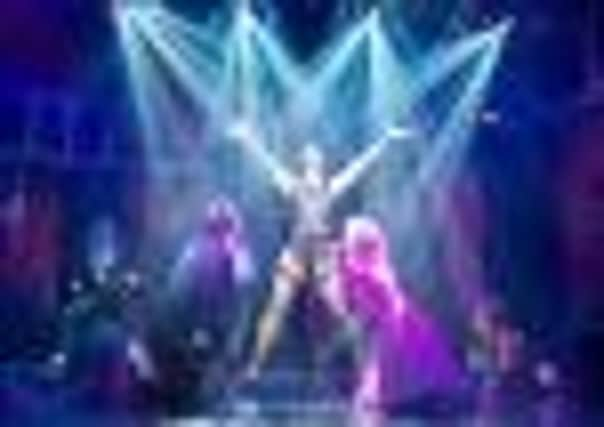Theatre reviews: The Commission | Scenes Unseen | The Rocky Horror Show


The Commission
Oran Mor, Glasgow
****
Scenes Unseen
Tron, Glasgow
****
The Rocky Horror Show
Playhouse, Edinburgh
****
The artist finds herself unable to avoid painting the hideous terror and slaughter that accompanied the battle; the commission itself becomes a battlefield, between artist and state. And if you want to see a short, brilliant, savagely funny contemporary reworking of the same theme, veering through a firestorm of sharp comic one-liners to a shudderingly powerful conclusion, then Steven Dick’s The Commission – this year’s winner of the Oran Mor/Channel 4 Comedy Drama Award – is the play you need to catch, this week at Oran Mor, or next week at the Traverse.
The scene is a fashionable London gallery, where smart dealer Will is waiting for his tame – or excitingly untamed – Scottish artist, one Peter Harris. Harris is a grubby, hard-drinking, hard-swearing type who has been commissioned by the Ministry of Defence to go to Afghanistan and produce work based on the experience of British troops there; but it turns out that he has his own explosively conceptual idea about how to express his view of the war.
Advertisement
Hide AdFor much of its length, The Commission mainly involves a series of brilliant jokes about the condition of life, politics, art and class in Coalition Britain; towards the end, it veers perilously close to dismissing the whole business of modern art as a con. Yet throughout, there’s a backbeat of seriousness, of energy, even of violence, in Stewart Porter’s superb performance as Harris, that suggests there is much more to this show than a mere joke at the expense of the modern art world. There’s also a genuine play about war, and the despair and rage it evokes in any sentient human being; and in the play’s final scene – after Russell Layton’s suave dealer and Selina Boyack’s jolly lady defence minister have left the scene – Pete Collins’s fine production gathers it all together, in a moment of magnificent tragic reflection.
If war is one of the means traditionally used by men to construct an idea of male identity, then Andy Arnold’s strange, interesting bill of eight short plays, at the Tron, seems to be set in the junk heap where most of our traditional ideas about masculinity and male-female relations have now come to rest. Placed by designer Kirsty McCabe on a set full of slightly picturesque trash, Scenes Unseen matches work by four young playwrights – Lynsey Murdoch, Andrew Stott, Stef Smith and Julie Tsang – with a series of “shorts” by four great theatre writers, Athol Fugard, Alan Ayckbourn, JP Donleavy and Patrick Marber; and in play after play, we see marriages failing, romance foundering, men competing like fools, betraying their women, damaging their children, or unable to control their violence.
Oddly enough, the show is at its strongest and most moving when the young writers are stretching and challenging themselves, as in Smith’s meditation on three men on the brink of change, or Tsang’s heartbreaking double monologue about the end of a young, violent relationship; the four famous writers, with the exception of Fugard, seem to use the short format to have a bit of a laugh, although Donleavy’s absurdist fragment The Interview has plenty to say about America in the age of Mad Men. In the end, though, Scenes Unseen makes a fascinating evening of theatre, full of variety, but circling around a single powerful theme. The actors are Keith Fleming, Gavin Wright, Brian Pettifer and Natalie Toyne; and they work best when they’re delivering the words of the young writers straight to the audience, as if – when it comes to these plays – they feel a deeper sense of responsibility, and a stronger pressure to give every sentence its full weight of meaning.
Perhaps it’s because it offers such a complete, liberating blast of comic relief from conventional ideas about masculinity that Richard O’Brien’s mighty Rocky Horror Show – now, incredibly, on its 40th anniversary tour around the UK – remains so hugely popular, at any rate with its own exuberant, dressed-to-kill fans.
It’s no accident that its sweet central couple, Janet and Brad, step straight from early-60’s America into the wild, outrageous, gender-bending, sci-fi world of the show’s glittering anti-hero, Frank-N-Furter; their suburban shock at Frank’s escapades, and their rapid surrender to his bisexual charms, provides the main narrative impulse of the show. At the Playhouse this week, Christopher Luscombe’s anniversary production – complete with terrific live band led by Tony Castro – offers a joyous celebration of all that is camp and comic in the Rocky Horror phenomenon, with a tipsy stage swathed in a giant strip of old celluloid film, distinguished actor-director Philip Franks enjoying himself mightily as the narrator, and Oiver Thornton turning in an intensely glamorous and charismatic performance as Frank-N-Furter, magnificent legs to the fore.
In the end, the show has a debatable tendency to assume that the mere sight of men in stockings and high heels is both hilarious and theatrical; after last week’s Priscilla Queen Of The Desert, which inhabits the same territory, it’s worth wondering for how many decades this effect will last. For now, though, it still delivers huge audiences, shrieking with taboo-busting delight; and when it comes with such a classy blast of music, dancing, acting and design, there’s no denying that even 40 years on, this show rocks.
• The Commission is at Oran Mor, Glasgow, until 16 March, and at the Traverse, Edinburgh, from 19-23 March. Scenes Unseen and The Rocky Horror Show both run until 16 March.